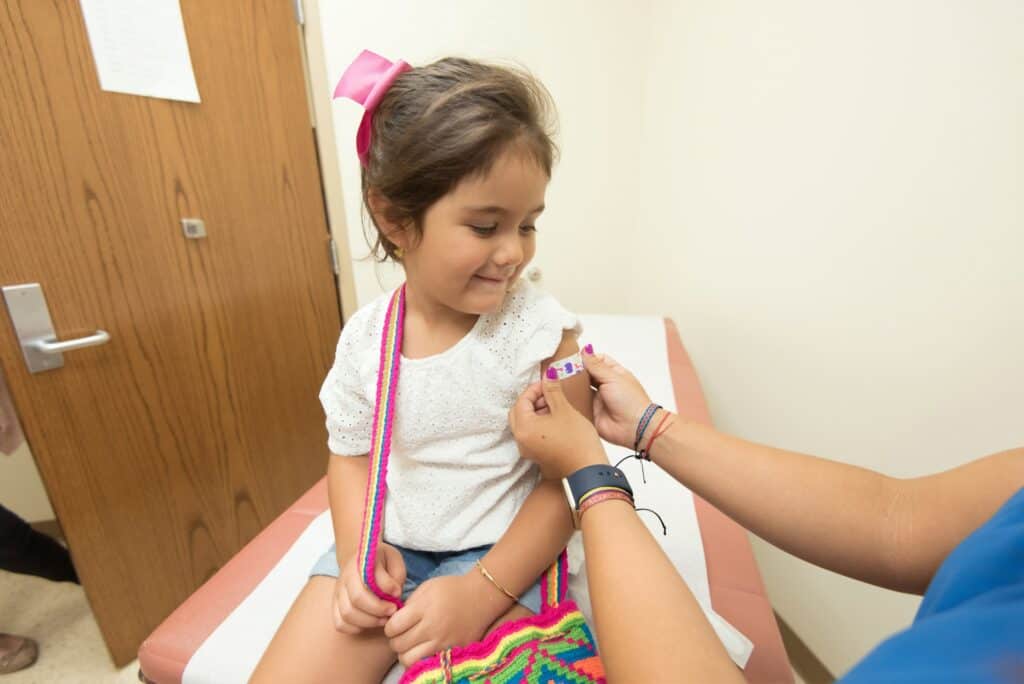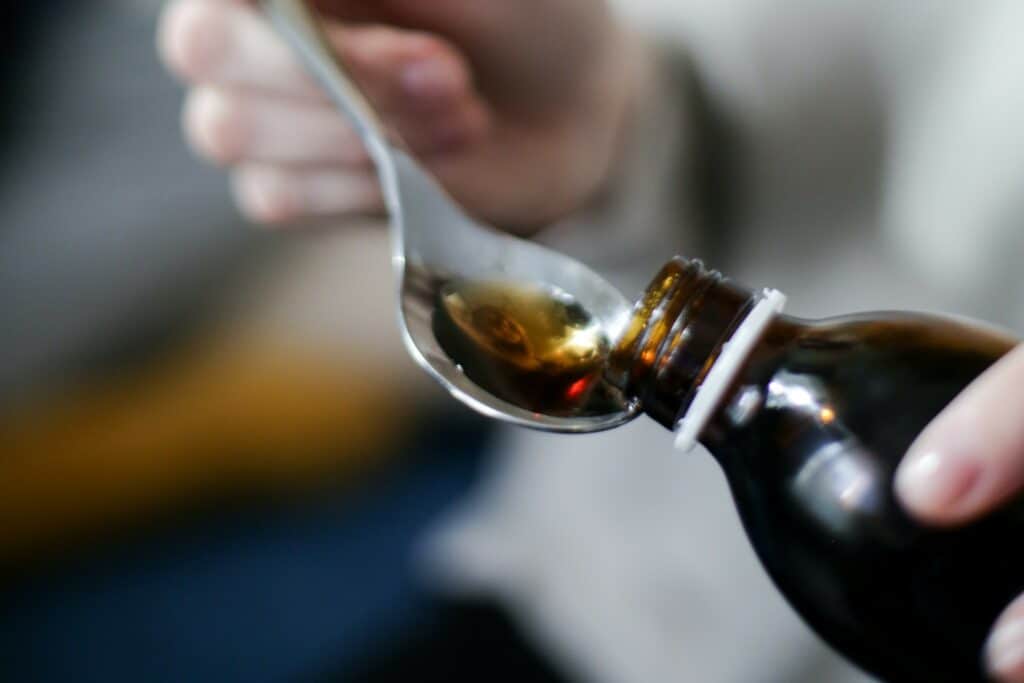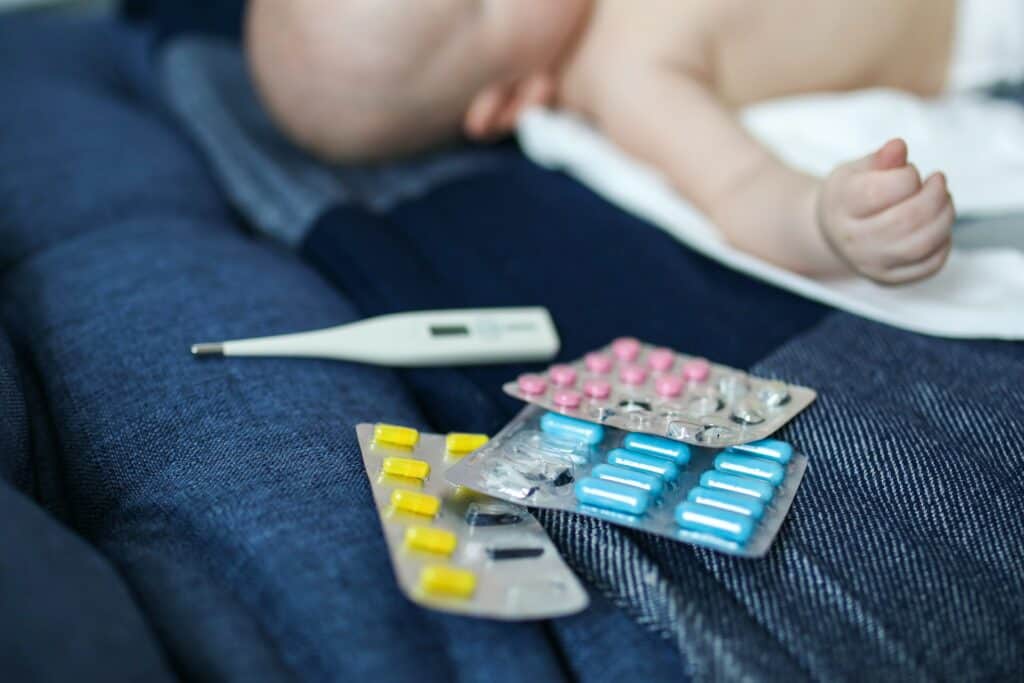Giving medicine to a toddler can be a daunting task, especially when they refuse to take it. This can be a stressful experience for both the parent and the child, but there are ways to make it easier. Understanding how to give medicine to a toddler who refuses, choosing the right medicine, preparing it correctly, and using the right tools and techniques can all help make the process smoother.
One of the main reasons why toddlers refuse medicine is because of the taste. Many medicines have a bitter or unpleasant taste that can be hard for a child to swallow. Additionally, toddlers may not understand why they need to take medicine, which can make them resistant to the idea. However, with the right approach and techniques, parents can help their child take medicine without any fuss.
Key Takeaways
- Understanding why toddlers refuse medicine can help parents find the right approach to giving medicine.
- Choosing the right medicine, preparing it correctly, and using the right tools and techniques can all make the process easier.
- Masking the taste of medicine and using food and drinks to administer it can be effective techniques for getting toddlers to take medicine.
Understanding Why Toddlers Refuse Medicine
Giving medicine to a toddler can be a challenging task. Toddlers are known for their picky eating habits and refusal to take medication. As a parent or caregiver, it is essential to understand why toddlers refuse medicine to help make the process easier.
One of the main reasons why toddlers refuse medicine is that they may associate it with feeling sick. They may have had a bad experience with medicine in the past, such as experiencing an adverse reaction or feeling nauseous. Toddlers may also be afraid of the taste or texture of the medication, which can make them hesitant to take it.
Another reason why toddlers refuse medicine is that they may not understand why they need to take it. They may not be able to communicate their symptoms or understand the concept of medicine. This can make it challenging for parents to explain why the medicine is necessary and why it will help them feel better.
It is also important to note that toddlers may refuse medicine if they are feeling unwell. They may be experiencing discomfort or pain, which can make it difficult for them to swallow or take medication. In some cases, toddlers may also refuse medicine if they are feeling overwhelmed or stressed.
Overall, understanding why toddlers refuse medicine can help parents and caregivers find ways to make the process easier. By addressing any underlying fears or concerns and explaining the importance of taking medication, parents can help toddlers feel more comfortable and willing to take their medicine.
Choosing the Right Medicine
When it comes to giving medicine to a toddler, it’s important to choose the right medicine for the specific situation. Whether it’s a prescription or non-prescription medicine, there are a few things to keep in mind.

First, it’s important to talk to a healthcare professional, such as a pharmacist or doctor, to ensure that the medicine is appropriate for the child’s age and weight. They can also provide guidance on the correct dosage and any potential side effects.
When choosing a non-prescription medicine, it’s important to look for one that is specifically formulated for children. These medicines typically have lower doses of active ingredients and may be available in a liquid form that is easier for children to swallow.
If the child needs a prescription medicine, it’s important to follow the instructions carefully. This may include giving the medicine at specific times of the day or with food. It’s also important to finish the entire course of the medicine, even if the child starts feeling better before it’s finished.
In some cases, antibiotics may be prescribed for a short-term illness. It’s important to follow the instructions carefully and not to give antibiotics for viral infections, as they are not effective against viruses.
Overall, choosing the right medicine for a toddler requires careful consideration and guidance from a healthcare professional. By following their advice and instructions, parents can help ensure that their child receives the appropriate drug therapy for their specific needs.
Preparing the Medicine
When it comes to giving medicine to a toddler who refuses, preparing the medicine is a crucial step. Here are some tips to make the preparation process easier:

Liquid Medicine
If the medicine is in liquid form, make sure to shake the bottle well before use. Use a syringe or dropper to measure the correct dosage. You can also mix the medicine with food or drink to make it more palatable for your toddler. However, be sure to check with your doctor or pharmacist first to make sure the medicine can be taken with food or drink.
Capsules and Pills
If the medicine is in capsule or pill form, you can try crushing it and mixing it with food or drink. However, not all medicines can be crushed, so be sure to check with your doctor or pharmacist first. You can also try opening the capsule and mixing the contents with food or drink.
Special Flavor
Some pharmacies offer the option to add a special flavor to liquid medicine to make it more appealing to children. If this is an option, consider trying it out to see if it helps your toddler take the medicine more easily.
Refrigeration
Some medicines need to be refrigerated, so be sure to check the label and follow the instructions carefully. If the medicine needs to be refrigerated, make sure to store it in a place where your toddler cannot reach it.
By following these tips, you can make the preparation process easier and increase the chances of your toddler taking their medicine without any issues.
Tools for Administering Medicine
When it comes to giving medicine to a toddler who refuses, having the right tools can make all the difference. Here are some of the most commonly used tools for administering medicine:

Syringe
A syringe is a tool that is commonly used to administer medicine to toddlers. It is a small plastic or glass tube with a plunger at one end and a needle or nozzle at the other. While needles are not necessary for administering medicine to toddlers, syringes without needles can be used to accurately measure and administer liquid medicine.
Medicine Dropper
A medicine dropper is another tool that can be used to administer liquid medicine to toddlers. It is a small plastic tube with a bulb at one end and a tip at the other. To use a medicine dropper, the bulb is squeezed to draw the liquid medicine up into the tube, and then the tip is placed in the toddler’s mouth to dispense the medicine.
Plastic Medication Syringe
A plastic medication syringe is a type of syringe that is specifically designed for administering medicine. It is often used in hospitals and clinics, but can also be purchased for home use. Plastic medication syringes are typically marked with measurements in milliliters, making it easy to accurately measure and administer liquid medicine.
Dosing with Syringe
When using a syringe to administer medicine to a toddler, it is important to use the correct dosing. The dosing for liquid medicine is typically based on the child’s weight, so it is important to follow the instructions on the medicine label or consult with a healthcare provider to determine the correct dosing for the child.
Dosing with Household Spoons
While some parents may be tempted to use a household spoon to administer medicine to a toddler, this is not recommended. Household spoons are not accurate for measuring medicine, and can lead to under or overdosing. It is always best to use a syringe or other measuring tool to ensure the correct dosing.
Overall, having the right tools for administering medicine can make the process easier and more accurate. It is important to use the correct dosing and to always follow the instructions on the medicine label or consult with a healthcare provider.
Techniques for Giving Liquid Medicine
Giving liquid medicine to a toddler who refuses can be a challenging task. However, with the right technique, it can be made easier and less stressful for both the parent and the child.

Using the wrong technique for giving medicine can make the process more difficult and increase the chances of the child spitting out the medicine or not swallowing it properly.
A good technique for giving liquid medicine involves having the child sit up in a comfortable position. This can help the medicine go down the throat more easily. The child’s chin should be slightly lifted to make swallowing easier.
Using a medicine dropper or plastic medication syringe can also make giving medicine easier. Dosing with a syringe is more accurate than using a spoon, and it can be easier to control the amount of medicine the child receives.
Here are some more techniques for giving liquid medicine:
- Mix the medicine with a small amount of juice or milk to make it more palatable.
- Use a reward system to encourage the child to take the medicine, such as a sticker or small toy.
- Offer the child a drink of water or a favorite beverage after taking the medicine to help wash it down.
- Use a distraction technique, such as singing a song or telling a story, to help the child focus on something other than the medicine.
Overall, giving liquid medicine to a toddler who refuses can be challenging, but with the right technique and a little patience, it can be done successfully.
Techniques for Giving Capsules and Pills
Giving capsules and pills to a toddler can be challenging, especially when they refuse to swallow them. Here are some techniques that can make it easier:

1. Crush and Mix with Food or Drink
One way to give capsules and pills is to crush them and mix them with a small amount of food or drink. This can be a good option for children who have difficulty swallowing pills. However, make sure to check with the doctor or pharmacist before crushing any medication, as some may lose their effectiveness when crushed.
2. Use a Pill Swallowing Cup
A pill swallowing cup can be a useful tool for children who have trouble swallowing pills. These cups have a special design that helps the pill go down smoothly without getting stuck in the throat. They are available at most drugstores and online.
3. Use the Gumline Technique
The gumline technique involves placing the pill or capsule between the teeth and the cheek, where it can dissolve and be absorbed by the body. This technique is best for children who are old enough to understand and follow instructions.
4. Use the Pouch Inside the Cheek Technique
Similar to the gumline technique, the pouch inside the cheek technique involves placing the pill or capsule between the cheek and the gums. This creates a small pouch where the medication can dissolve and be absorbed by the body.
5. Use Gravity
Another technique is to use gravity to help the pill or capsule go down. Give the child a small amount of water or juice to drink, then tilt their head back slightly. This can help the pill or capsule slide down the throat more easily.
Remember, it’s important to always follow the instructions of the doctor or pharmacist when giving medication to a child. If a child continues to refuse medication, consult with the doctor for alternative options.
Masking the Taste of Medicine
When a toddler refuses to take medicine because of its bad taste, masking the taste can be the solution. There are several ways to make medicine more palatable for children.

One way is to mix the medicine with a flavorful liquid, such as juice. This can help mask the taste of the medicine and make it more appealing to children. However, it is important to make sure that the juice does not interfere with the effectiveness of the medicine.
Another option is to use sweeteners for medicines that taste bad. There are many products available that can help mask the taste of bad-tasting antibiotics or other medicines. For example, chocolate syrup, strawberry syrup, and pancake syrup can all be used to make medicine more palatable.
Kool-Aid powder is another option for masking the taste of medicine. Mixing the medicine with a small amount of Kool-Aid can help make it more appealing to children. However, it is important to make sure that the Kool-Aid does not interfere with the effectiveness of the medicine.
In some cases, a spoonful of sugar can also help make medicine more palatable. As Mary Poppins famously said, “A spoonful of sugar helps the medicine go down.” However, it is important to use sugar in moderation and only when appropriate.
Overall, there are many ways to mask the taste of medicine for toddlers who refuse to take it. By using flavorful liquids, sweeteners, and other products, parents can make medicine more palatable and easier for their children to take.
Using Food and Drinks to Administer Medicine
When it comes to administering medicine to a toddler, one of the most common challenges is getting them to swallow it. Fortunately, there are several ways to make the process a little easier. One effective method is to use food or drinks to mask the taste of the medicine and make it more palatable.
One popular option is to mix the medicine with applesauce or yogurt. These foods have a smooth texture and a mild flavor that can help to mask the bitterness of the medicine. Simply mix the medicine into a small amount of yogurt or applesauce and offer it to your toddler on a spoon.
Another option is to mix the medicine with breastmilk or formula. This can be especially helpful for infants who are still nursing or taking bottles. Simply mix the medicine into a small amount of breastmilk or formula and offer it to your baby in their usual feeding position.
If your toddler has a favorite juice or drink, you can also try mixing the medicine into a small amount of that. This can be a great way to make the medicine more appealing and easier to swallow. Just be sure to check with your pediatrician to make sure that the medicine can be safely mixed with the drink.
It’s important to note that while using food and drinks to administer medicine can be effective, it’s also important to be cautious. Make sure to follow the dosage instructions carefully and never try to hide medicine in foods or drinks that your child is allergic to or dislikes. Always check with your pediatrician before trying any new methods of administering medicine to your toddler.
Ensuring Safety While Giving Medicine
When it comes to giving medicine to a toddler who refuses, ensuring safety is of utmost importance. Parents must take necessary precautions to prevent any mishaps that could harm their child.

One of the biggest risks associated with giving medicine to children is accidental poisoning. Parents should always keep all medications out of reach of children and in a secure location. It is also important to read the label carefully and follow the dosage instructions provided by the pediatrician or pharmacist.
Another concern is vomiting. If a child vomits after taking medicine, parents should not administer another dose unless advised by a healthcare professional. It is also important to monitor the child for any adverse reactions or side effects.
To ensure that the child is taking the correct medication, parents should double-check the label and verify the dosage with the pediatrician or pharmacist. It is also important to use the correct measuring device, such as a syringe or dropper, to administer the medication.
In case of any doubts or concerns, parents should consult with their pediatrician. They can provide guidance on how to safely give medicine to a toddler who refuses and answer any questions or concerns related to the child’s health and safety.
Motivating Your Child to Take Medicine
Giving medicine to a toddler who refuses can be a challenging task for parents. However, with the right approach, it can be made easier. Here are some tips to motivate your child to take medicine:
1. Treat It Like a Choice
Toddlers love to feel in control of their own decisions. Therefore, it is important to present taking medicine as a choice rather than a forced action. For example, you can ask your child if they would like to take their medicine now or in a few minutes. Giving them the illusion of choice can make them more cooperative.
2. Offer Rewards
Offering small rewards like stickers or a favorite treat can be a great motivation for your child to take medicine. You can create a chart and give them a sticker every time they take their medicine without fuss. After a certain number of stickers, they can earn a bigger reward like a toy or a trip to the park.
3. Try Different Flavors
Some children may refuse medicine because of its taste. You can ask your pediatrician if there are different flavors available for the medicine and choose the one your child likes the most. This can make the medicine more palatable and easier to swallow.
4. Be Cheerful and Encouraging
Your child can sense your anxiety and frustration, which can make them more resistant to taking medicine. Therefore, it is important to remain calm, cheerful, and encouraging during the process. You can sing a song or tell a story to distract them while you give them the medicine.
5. Twist the Truth
Sometimes, a little white lie can go a long way. You can tell your child that the medicine will make them feel better or stronger, even if it is not entirely true. This can motivate them to take the medicine and feel proud of themselves for doing so.
6. Have a Cooperative Child
If your child is cooperative, you can involve them in the process of giving medicine. You can ask them to hold the cup or the spoon or even pretend to be the doctor. This can make them feel important and engaged in the process.
By following these tips, you can motivate your child to take medicine without fuss and ensure that they get the treatment they need.
Dealing with Medicine Refusal and Other Challenges
When it comes to giving medicine to a toddler, parents often face the challenge of refusal. Toddlers may refuse to take medicine due to its taste, texture, or smell. In such cases, parents can try the following methods:

- Mixing the medicine with a small amount of juice or milk can make it more palatable for the child.
- Using a plastic syringe or dropper can help deliver the medicine more accurately and avoid spills.
- Breaking up the dosage into smaller amounts and giving it slowly can make it easier for the child to swallow.
- Offering a reward or distraction, such as a favorite toy or book, can encourage the child to take the medicine.
However, it is important to note that some children may still refuse to take medicine despite these efforts. In such cases, parents should consult with their child’s healthcare provider for alternative options.
Another challenge parents may face is vomiting after giving medicine. If a child vomits within 20-30 minutes of taking medicine, parents should consult with their healthcare provider to determine if a second dose is necessary.
Parents should also be aware of potential allergic reactions to medication. If a child experiences any symptoms of an allergic reaction, such as swelling, rash, or difficulty breathing, parents should seek medical attention immediately.
In summary, dealing with medicine refusal and other challenges requires patience, creativity, and careful attention to dosage and delivery. Parents should consult with their healthcare provider for guidance and support.
Conclusion
Giving medicine to a toddler who refuses can be a challenging task for many parents and caregivers. However, with the right approach and techniques, it can be done safely and effectively.
It is important to always prioritize the child’s health and safety when administering medication. This includes checking the dosage and expiration date of the medication, as well as ensuring that it is stored properly and out of reach of children.
When a toddler refuses to take medicine, it is essential to remain calm and patient. Offering a reward or distraction can often help encourage the child to take the medication. However, it is important to avoid using force or coercion, as this can be dangerous and lead to negative associations with medication.
Parents and caregivers should also be aware of any potential side effects or interactions with other medications the child may be taking. It is important to consult with a healthcare professional if there are any concerns or questions about medication administration.
In summary, giving medicine to a toddler who refuses can be challenging, but with the right approach and considerations for health and safety, it can be done effectively.
Related post: Toddler Refuses to Drink Milk from Sippy Cup
Frequently Asked Questions
How can I make medicine more appealing to a toddler?
Making medicine more appealing to a toddler can be challenging, but there are a few things you can try. You can try adding a small amount of sugar or honey to the medicine to make it taste better. You can also try giving the medicine with a favorite drink or food to mask the taste.
How do I get my toddler to take medicine without spitting it out?
Getting a toddler to take medicine without spitting it out can be difficult. One trick is to use a medicine dropper or syringe to place the medicine directly into the back of the toddler’s mouth. You can also try blowing on your toddler’s face or gently stroking their cheek to encourage them to swallow.
What are some tricks for giving medicine to a resistant toddler?
There are several tricks you can try to give medicine to a resistant toddler. You can try distracting your toddler with a favorite toy or book while giving them the medicine. You can also try singing a song or making a game out of taking the medicine.
How much medicine should I give my toddler if they spit it out?
If your toddler spits out the medicine, you should check with your doctor or pharmacist to determine how much medicine to give them. It is important to follow the prescribed dosage to ensure that your toddler receives the correct amount of medication.
Are there any alternative methods for giving medicine to a toddler?
There are a few alternative methods for giving medicine to a toddler. You can try using a medicine patch or a suppository if your toddler is resistant to taking medicine orally. You can also ask your doctor or pharmacist if there are any alternative forms of the medication available.
What should I do if my toddler refuses to take medicine?
If your toddler refuses to take medicine, it is important to stay calm and patient. You can try offering a reward or praise for taking the medicine, or you can try giving the medicine at a different time or in a different form. If your toddler continues to refuse the medicine, you should consult with your doctor or pharmacist for further guidance.

Iesha is a loving mother of 2 beautiful children. She’s an active parent who enjoys indoor and outdoor adventures with her family. Her mission is to share practical and realistic parenting advice to help the parenting community becoming stronger.
